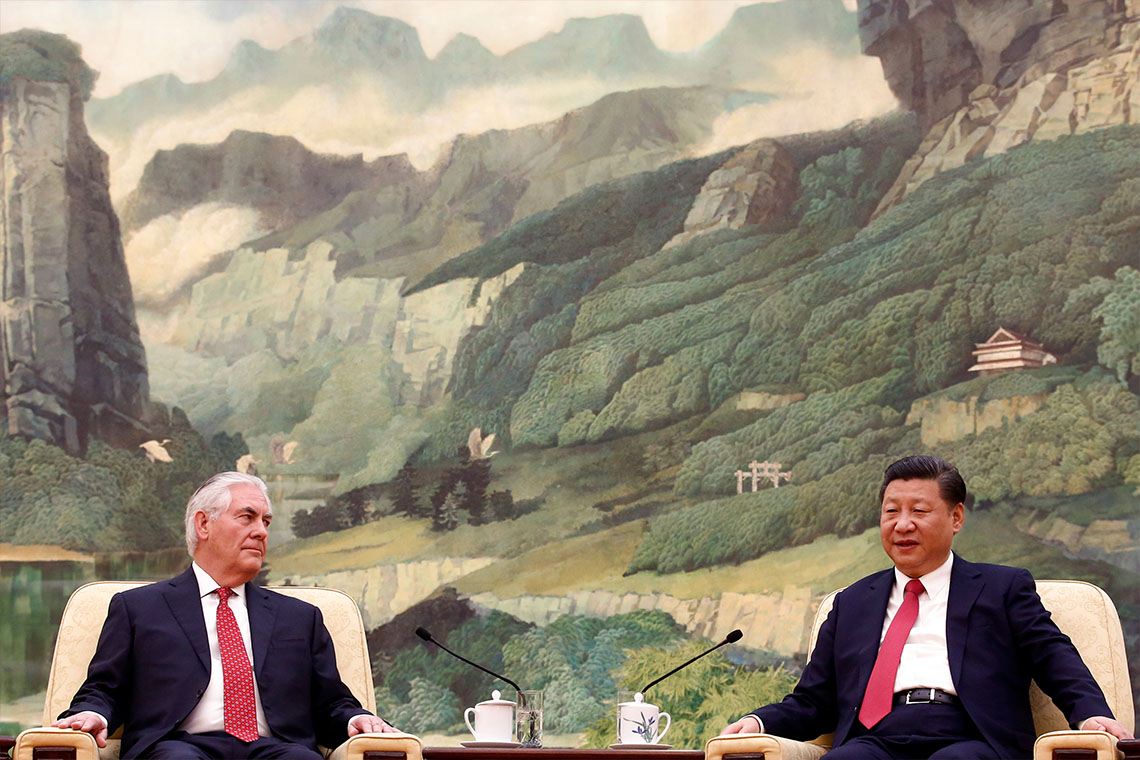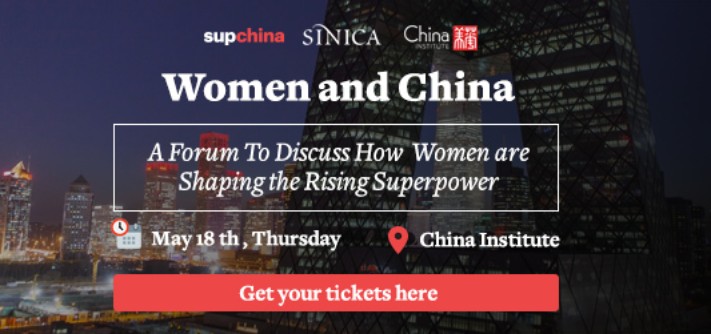Toxic ponds near Beijing
A roundup of top China news from April 21, 2017. Get this daily digest delivered to your inbox by signing up at supchina.com/subscribe.

Twenty giant ponds of poisonous sludge
Caixin reports that the Ministry of Environmental Protection (MEP) has “confirmed that there were nearly 20 giant ponds where untreated wastewater had been dumped for years” in an area about 40 miles (60 kilometers) south of Beijing. The existence of the ponds — “covering an area of 300,000 square meters in total, or the size of 42 soccer pitches” — was first publicized by an environmental NGO, the Chongqing Liangjiang Voluntary Service Center (link in Chinese), on its verified WeChat account. Caixin says its WeChat account was “blocked as of Thursday by chat service operator Tencent Holdings,” but the MEP has taken up the cause, confirming “on Wednesday that its investigation team had found three toxic wastewater dumps in a rural town in the Jinghai District in Tianjin and two ponds containing acidic industrial wastewater in rural Dacheng County, in Langfang, in neighboring Hebei Province.” The MEP said that local authorities had known about some of the wastewater dumping sites since 2013, and that cleanup work had already “been completed on 15 ponds by the end of 2016.”
Reuters reports that a MEP official, speaking at a press conference on Friday, said that the ministry was “extremely open to all kinds of NGOs, the public and the media helping to provide oversight, so we can improve our environment.” He also said that it was “unclear how many similar pits China has.”
In other environmental news, Reuters notes that a campaign aimed at “normalizing compliance” in 28 cities in the Beijing-Tianjin-Hebei region began this month. The MEP says that “4,077 firms had already been investigated as part of the campaign, and 2,808 firms were found to have violated environmental rules.”
Count your days
We have been covering news about exiled tycoon Guo Wengui 郭文贵 since January. His allegations of high level corruption in China — more than two years after stories of his own corrupt activities were published in China — have been met with further counter-accusations in the form of an Interpol “red notice” for him requested by the Chinese government, and a video confession of a man claiming to be disgraced top spy Ma Jian 马建, who makes his own accusations against Guo.
The latest battle in the war of words across the Pacific is an article by Caixin magazine, whose editor Guo has previously accused — on Twitter — of improper collaboration with the Chinese government. Caixin says that it has seen “a report to the Central Commission for Discipline Inspection” which shows evidence of Guo’s involvement in various corrupt schemes. When one of the men involved in those schemes was detained by police, Caixin says that Guo warned him by saying “You dare to report me, count your days.”
Welcome to John Pomfret
In case you missed it earlier this week, the veteran China journalist and author has become a regular contributor to The China Project. His first piece for us was published earlier this week: Accomplishing what they could not at home: The bond between American and Chinese women. There are links to other articles, podcasts, and videos we published this week on our website and apps below.
As always, simply hit reply to this email to send me feedback.
—Jeremy Goldkorn, Editor-in-Chief
The Caixin-Sinica Business Brief, episode 2
The second installment of The China Project’s new weekly show with China’s leading business and financial news source. Please send any feedback to sinica@thechinaproject.com.
This is what Shanghai foodies crave
The China Project brings you a guide to the hottest items on the menu in Shanghai.
Viral video Friday
From a strange new parking technique to basketball yoga: Watch Jia Guo’s one-minute compilation of the videos that lit up China’s internet over the past week.
This week on The China Project:
- Sinica Podcast: What actually happened at Mar-a-Lago?
- Video: Live streaming in China
- Video: Who is Anna May Wong? Hollywood’s first Chinese-American icon
This week’s news roundups are:
- April 17: ‘Swords drawn’ over North Korea
- April 18: No porn on WeChat for government officials
- April 19: A billionaire on the run
- April 20: He fled from Bo Xilai; now he wants to make 300,000 electric cars in China
This issue of the The China Project newsletter was produced by Sky Canaves, Lucas Niewenhuis, Jia Guo, and Jiayun Feng. More China stories worth your time are curated below, with the most important ones at the top of each section.
BUSINESS AND TECHNOLOGY:
A payments war between WeChat and Alipay
Tech in Asia wrote today on “How WeChat Pay became Alipay’s largest rival,” arguing that the “sticky” social experience of WeChat — the app that mobile users in China spend 35 percent of their screen time using — allowed its “red packet” (红包 hóngbāo) feature to spread rapidly. Though Alipay, owned by Alibaba, still maintains a majority market share (54.7 percent) in mobile payments by providing a “robust array of financial services,” the “red packet” feature to send small cash gifts to friends on WeChat has given WeChat Pay a user base much larger than Alipay’s.
Both companies are now fiercely competing in the online-to-offline (O2O) market, which includes food delivery services and ride hailing. And while it is difficult to predict who will win out in the quickly changing and booming online payment market, Alipay and WeChat are being seen as examples of models of innovation in a new report from the Better Than Cash Alliance. The report, written by a United Nations–affiliated team, notes that “in poor communities, digital payments are proving to be an effective way to open up new economic opportunities and markets for individuals and small businesses.”
-
Tencent, Moutai shares sparkle with new global milestones / Caixin
“Recent runups in their stocks powered internet leader Tencent and liquor giant Moutai past two major milestones last week, as the former became the world’s 10th-most-valuable company and the latter took the global crown for most valuable liquor maker.” - China’s credit excess is unlike anything the world has ever seen / SCMP
- Chinese workers might not be too happy with their pay raises / Bloomberg
- Eyeing U.S. market, Chinese automaker may change Trumpchi brand name / Reuters
POLITICS AND CURRENT AFFAIRS:
The symbolism of Xi Jinping’s choice of district
There are no open elections to national-level political positions in China, so the news earlier this week that President Xi Jinping had won a seat as a delegate to the 19th National Congress of the Communist Party of China (CPC) was unremarkable on the surface. But today, the Wall Street Journal has a piece exploring the meaning behind Xi’s unusual choice of district to “run” from: the poor, southwestern province of Guizhou, where he has neither lived nor held office in his life. One former top political science professor tells the Journal that Xi is “sharing a platform” with Chen Miner 陈敏尔, the Guizhou Party chief whose poverty alleviation focus dovetails with Xi’s rhetoric. Furthermore, it may signal that Chen is likely to gain a seat in the powerful 25-member Politburo when the new CPC National Congress votes this fall.
-
China rights lawyer wins little in successful appeal of sentence / SCMP
“Rights lawyer Xia Lin, who has defended high-profile activists and dissidents, had his jail term reduced from 12 to 10 years by an appeal court in Beijing on Friday, his lawyer said. Xia, whose former clients include outspoken artist Ai Weiwei, Sichuan earthquake activist Tan Zuoren and rights lawyer Pu Zhiqiang, was first convicted of fraud involving 4.8 million yuan ($697,000) last September, nearly two years after being detained.” -
Former senior Hebei official stands trial for bribery / ECNS.cn
Zhang Yue, a former provincial-level official in northern China’s Hebei Province, is accused of “taking advantage of his positions to seek benefits for others and of accepting money and assets worth more than 157 million yuan (nearly 23 million U.S. dollars) between 2008 and 2016.” -
Philippines sends defense chief to disputed South China Sea island / NYT (paywall)
“The Chinese challenged the flight at least four times on radio as it passed through the region. China claims the island, as do Vietnam and Taiwan.” - Chinese coastguard accused of firing on Philippine fishing boat / SCMP
-
U.S. official: With eye on North Korea, China puts bombers on ‘high alert’ / CNN
“But China’s Ministry of National Defense said the U.S. official’s assertions were ‘not true.’” -
Chinese drama shelved / China Media Project
White Deer Plain (白鹿原 bái lù yuán) was pulled after airing for exactly one episode, an unusual time for censors to step in, David Bandurski reports. It is not yet clear what caused the move, although some allege political pressure. - You will pay: Chinese media warn India over Dalai Lama’s Arunachal visit / Hindustan Times
SOCIETY AND CULTURE:
Does Dolce & Gabbana’s ad campaign feature an ‘underdeveloped China’?
Italian fashion brand Dolce & Gabbana (D&G) has pulled an online advertisement campaign that was shot in Beijing and sparked accusations of only showing the dilapidated side of modern China. In the collection of photos, several models wearing high-end fashion gowns pose themselves in Beijing’s centuries-old hutongs (hútòng 胡同) and famous tourist attractions such as Tiananmen Square, next to ordinary people such as tourists as well as taxi and pedicab drivers.
The marketing campaign is part of the brand’s attempt to localize itself to cater to Chinese consumers. D&G has launched similar campaigns in Hong Kong and Japan, in which models were seen against relatively fancier backgrounds with skyscrapers and flashing neon billboards.
The campaign triggered a huge debate in Chinese social media on whether D&G intentionally stereotyped China by choosing outdated street views as background instead of advanced modern areas such as the financial district in the city. Many of the comments on the Chinese social media platform Weibo labeled the photo collection as “offensive.” One internet user wrote, “It almost looks like North Korea! This is definitely not what China looks like now!” A photographer on Weibo compared (in Chinese) the D&G campaign with a photo collection featuring a Chinese theme that was produced by Vogue in 1993, saying, “D&G uses hashtag #DGLovesChina to promote their campaign, but I don’t sense any love in their photos.”
Others called the critical remarks too sensitive: “I guess everyone Chinese should examine themselves before going out. What they wear and where they are going. Are you being a drag on China’s image? If yes, you are not qualified to be Chinese. Meanwhile, we should learn from North Korea to designate a specific area for foreigners to take photos,” a Weibo user ridiculed (in Chinese) people from the opposite camp. There are more discussion on this topic on this Weibo thread (in Chinese).
- Journal retracts dozens of papers by Chinese scientists / Sixth Tone
- A new ‘cure’ for China’s millions of web addicts: Hack their computers / Foreign Policy
- Progress on depression slow in China as stigmas persist / ABC News
- China’s super-rich target environment, research in growing embrace with philanthropy / Caixin
- Bulldozers threaten what may be the world’s oldest animal fossils / Science







